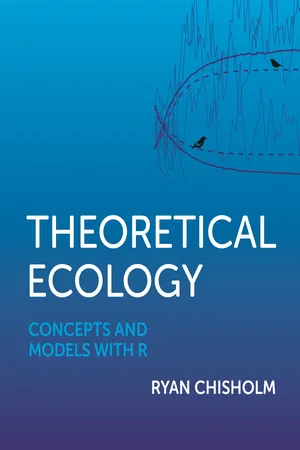
- English
- ePUB (mobile friendly)
- Available on iOS & Android
About this book
An accessible and wide-ranging introduction to the concepts and tools of theoretical ecology
Theoretical ecology explores the mechanisms that structure ecological communities using a variety of mathematical and computational tools. Theoretical Ecology shows you how to translate ecological problems into mechanistic models using both mathematics and the programming language R. The book teaches key concepts and core quantitative skills while also devoting significant attention to the reasons for building mathematical ecological models. Why do species populations fluctuate over time and space? How do multiple species coexist? What forces drive nutrient and carbon cycles? Does higher species diversity lead to higher biomass? Each chapter in this incisive and informative book is motivated by questions like these, and every chapter includes boxes that delve into mathematical details and provide coding examples in R.
- Focuses on mathematical and computational methods while also drawing on conceptual and graphical approaches, and explores how the various approaches complement one another
- Teaches students the skills they need to implement and analyze ecological models in R
- Covers topics ranging from single-species, competition, and predator–prey models to community ecology, island biogeography, and nutrient-flux models
- Provides exercises of gradated difficulty at the end of every chapter
- Ideal for advanced undergraduate and graduate classrooms and for independent study
- Includes a road map for class planning and self-study
Frequently asked questions
- Essential is ideal for learners and professionals who enjoy exploring a wide range of subjects. Access the Essential Library with 800,000+ trusted titles and best-sellers across business, personal growth, and the humanities. Includes unlimited reading time and Standard Read Aloud voice.
- Complete: Perfect for advanced learners and researchers needing full, unrestricted access. Unlock 1.4M+ books across hundreds of subjects, including academic and specialized titles. The Complete Plan also includes advanced features like Premium Read Aloud and Research Assistant.
Please note we cannot support devices running on iOS 13 and Android 7 or earlier. Learn more about using the app.
Information
Table of contents
- Cover Page
- Title Page
- Copyright Page
- Contents
- Preface
- 1. Simple discrete-time models of single populations
- 2. Density dependence I: Equilibria and stability
- 3. Density dependence II: Cycles and chaos
- 4. Continuous-time models
- 5. Stage-structured models
- 6. Age-structured models
- 7. Metapopulation models
- 8. Spatial models
- 9. Multispecies discrete-time models
- 10. Multispecies continuous-time models
- 11. Introduction to community ecology
- 12. Competitive interactions
- 13. Predator–prey interactions
- 14. Island biogeography theory
- 15. Metacommunity theory
- 16. Neutral ecological theory
- 17. Towards unified models of community ecology
- 18. Dynamic vegetation models
- 19. Carbon- and nutrient-flux models
- 20. Biomass–diversity models
- Index